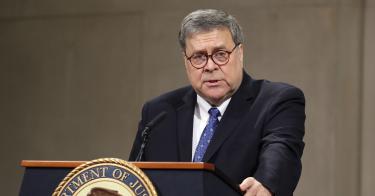Rarely does a U.S. attorney general get such blowback for a non-televised speech at a university. Yet that’s what happened last month to Attorney General William Barr.
On Oct. 11, Barr gave a speech at Notre Dame Law School that began with the unremarkable observation that “[f]rom the Founding Era onward, there was a strong consensus about the centrality of religious liberty in the United States.”
By the time he finished that speech, left-wing writers were pounding their keyboards with hair-on-fire indignation. Here’s what Barr said that got them so worked up.
The founding generation’s view of human nature “was drawn from the classical Christian tradition,” which is essential to our system of government. That system, he explained, enshrines and defends individual liberty and, therefore, has little ability to rein in “the unbridled pursuit of personal appetites at the expense of the common good.”
For that reason, he continued, the Framers placed their trust in “the self-discipline and virtue of the American people,” and relied on religion to provide those virtues. It does so by helping to “teach, train, and habituate people to want what is good.”
Barr continued by pointing out the growing effort to replace the Judeo-Christian moral system with “secularism and the doctrine of moral relativism.” Traditional religious values are not decaying, he said, but rather are the target of “organized destruction.”
He argued that secularists have attacked religion and those who hold religious beliefs with “social, educational, and professional ostracism,” lawsuits, and social media campaigns. Those who practice their faith publicly are shamed or sued into submission, while those who hold their beliefs privately are encouraged to keep their beliefs quiet under threats of public censure or ridicule.
The law, he argued, has been used to subdue religious expression and to force religious people to participate in practices antithetical to their faith.
President Barack Obama’s administration, for example, sued to force religious employers to provide abortifacient coverage in health plans. Meanwhile, states have passed laws requiring public schools to adopt LGBT advocacy curricula that are inconsistent with traditional Christian teaching and have made it illegal for parents to take their children out of those classes.
This is not “live and let live,” Barr argued, but rather an effort to “[compel] people to violate their conscience.”
While he called for people to emphasize “the moral education of our children,” he recognized that “[t]he times are hostile to this.”
Nothing proved that point quite as well as the barrage of spite and vitriol that the left hurled at Barr for this speech. The response in left-wing media outlets was astonishing, both for its reluctance to engage with Barr’s arguments and its willingness to throw invective at him instead.
The Chicago Tribune, for example, ran a piece accusing Barr of telling atheists to “go to hell.” Of course, Barr said no such thing. The New York Times’ reliably temperate Paul Krugman said that we should all be scared of Barr’s speech because “it’s the language of witch hunts and pogroms.”
Yet another writer declared that Barr’s speech made him feel “not just uncomfortable” but “disturbed.” Clutching his pearls, he wondered how Barr could even mention Judeo-Christian morals working for “such an unprincipled, morally bankrupt, fornicating, mendacious president.”
But the most amusing display of foot-stomping histrionics came from The New Yorker, which threw at Barr nearly every adjective its thick-prosed know-it-alls could pull out of Webster.
Not only was it “the worst speech by an attorney general of the United States in modern history,” it was “historically illiterate,” “morally obtuse,” “willfully misleading,” “vague,” “obscure,” “galling,” and “potted.”
Potted?
Never mind. Let’s see if Barr’s speech really deserved the Chicken Little hysteria it received.
Michael Farris, writing in The Hill, has already shown that Barr’s speech lined up with bipartisan sentiments in the 1990s when President Bill Clinton signed the Religious Freedom Restoration Act into law. So let’s go further back and compare Barr’s sentiments to the Founders’.
Is Barr’s vision of religion’s role in America really the potted pogrom his critics say it is?
It doesn’t seem like it. On the contrary, it echoes the Founders’ understanding that religion was paramount to the health and longevity of the union.
In his Farewell Address, George Washington noted that “morality is a necessary spring of popular government,” and that morality cannot exist without religion.
John Adams said, “Our Constitution was made only for a moral and religious people. It is wholly inadequate to the government of any other.”
The list of similar quotations from other Founders is long and uniform in this sentiment. The Founders all came from similar Christian traditions and recognized that those values were essential for a government that afforded its people enormous freedom.
It’s for that reason that the First Amendment protects religious freedom from government meddling by declaring: “Congress shall make no law respecting an establishment of religion.”
That’s not to say that each individual Founder was deeply pious. Some were not at all. But still they recognized what Barr reiterated: that the Christian tradition encourages a needed and irreplaceable morality in the people.
Modern-day secularists might like to erase religion’s central role in our history, just as they’d like to drive religious viewpoints from the public square today. But they should instead see the value that religion brings and embrace the freedom of religious people to practice their faith free from government coercion.
Barr did that in his speech, and his Justice Department is putting his words into action.
Undermining his critics’ claim that Barr cares only about Christians, Barr’s Justice Department continues to defend the religious liberties of Muslims, Christians, Jews, practitioners of Native American religions, and more. This effort is not only constitutional, but also praiseworthy.
At the end of the day, what Barr did was provide historical background to the First Amendment’s first guarantee, and affirm our responsibility to stand up for it. That’s hardly something to get upset about.
This piece originally appeared in The Daily Signal



